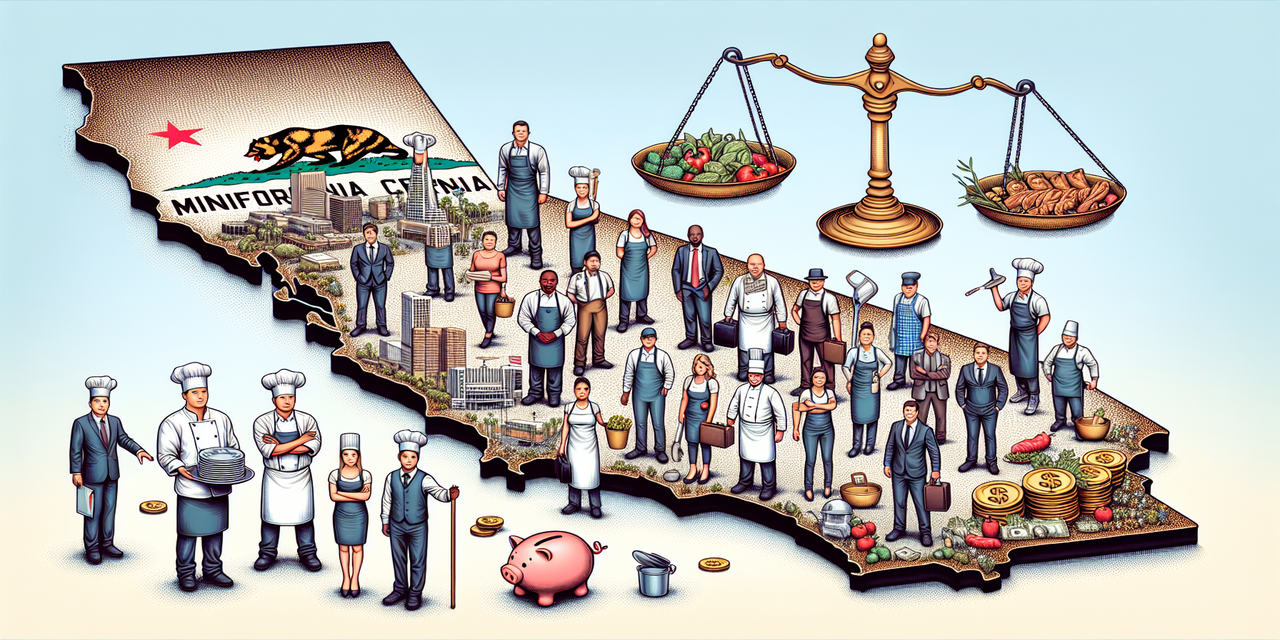California Minimum-Wage and Tip-Credit Rules: Key Takeaways
- As of January 1, 2025, California’s minimum wage is $16.50/hour statewide with no tip credit allowed.
- Local cities like Mountain View ($19.20), Palo Alto ($18.20), and San Diego ($17.25) set higher minimum wages that prevail over the state rate.
- Tips belong solely to employees; employers cannot use tips as wage offsets or deduct credit card fees from tips.
- Tip pooling is allowed among eligible staff but excludes managers, supervisors, and non-service employees.
California hospitality workers must understand that tips are above and beyond a full minimum wage, with clear rules protecting their earnings.
Employers in California's hospitality sector can benefit from best practices detailed in California overtime law 2025 worker rights to ensure compliance with wage and tip regulations.
This guide explains key minimum wage and tip laws impacting California’s hospitality industry and worker rights.
1. Understanding California Minimum-Wage and Tip-Credit Rules
California mandates that all employees, including those in hospitality, receive the full minimum wage—currently $16.50 per hour statewide starting January 1, 2025.
Unlike many states, California prohibits employers from applying a tip credit to wages; hospitality workers must be paid the full minimum wage plus any tips they receive.
Hospitality employers seeking to navigate these rules can check restaurant staff hiring strategies to ensure compliant and efficient hiring processes.
This means tips cannot be counted by employers to satisfy minimum wage requirements.
Hospitality workers should expect their base wages to never be below this minimum regardless of tips earned.
2. Local Minimum Wages in California and Hospitality Impact
Several California cities set minimum wage rates exceeding the statewide minimum to better reflect local living costs.
- Mountain View: $19.20/hour
- Palo Alto: $18.20/hour
- San Diego: $17.25/hour
If you work in these cities, your employer must pay whichever is higher between the state or the local minimum wage.
This local increase applies equally to hospitality employees and maintains the prohibition on tip credits.
For employers managing hospitality staff, insights on how to hire a restaurant manager can help maintain operational efficiency under local wage laws.
3. California Tip Laws and Employee Rights in Hospitality
Under California law, tips are the exclusive property of the employee who receives them.
Employers are strictly forbidden from taking any part of their employees’ tips or using them to offset wages owed.
Additionally, tips paid via credit card must be given to employees no later than the next regular payday after the payment authorization date.
Employers cannot deduct credit card processing fees or any other charges from employees’ tips; employees receive the full tip amount.
To better understand tip regulations and fair practices, employers can explore the can restaurant owners take tips resource.
4. Mandatory Service Charges and Their Treatment in California
California distinguishes between tips and service charges such as those automatically added to large party bills.
Mandatory service charges are not considered tips; they belong to the employer unless local ordinances specify otherwise.
For example, Santa Monica requires that service charges be distributed entirely to employees who provided the service.
If service charges are distributed to employees elsewhere, they are treated as regular wages subject to withholding taxes and employer payroll obligations.
5. Tip Pooling in California Hospitality Workplaces
Employers may require eligible tipped employees to share tips through a tip pooling arrangement.
Tip pools must be fair and reasonable, covering only employees who participate in providing direct table service or are in the service chain.
Managers, supervisors, cooks, dishwashers, and cashiers are typically excluded from tip pools.
This ensures tips are redistributed equitably among those who directly contribute to service quality.
Employers looking to implement or improve tip pools can use tools from the ultimate tip pooling spreadsheet template for clarity and fairness.
6. Timing and Payment of Tips Received via Credit Card
California law requires all tips paid through credit cards to be disbursed to employees by the next regular payday following authorization of the transaction.
This protects hospitality workers from delays in receiving their earned tips.
7. Penalties for Violations of California Tip and Wage Laws
Failure to comply with California’s tip and wage laws can lead to severe penalties for employers, including fines of up to $1,000.
Additionally, employers may face imprisonment for up to 60 days or both fines and jail time in serious cases.
Hospitality businesses must implement strict compliance measures to avoid these consequences.
Businesses can find useful guidance on background checks in California, which often tie into compliance and hiring regulations.
8. Best Practices for Hospitality Employers and Workers in California
Employers should clearly communicate wage rates and tip policies to all hospitality employees to ensure understanding and compliance.
Maintaining transparent records of tip pooling distribution and prompt payment of tips helps protect employees’ rights.
Workers should verify receipt of full minimum wages plus tips and report wage or tip discrepancies to the California Department of Industrial Relations or labor authorities.
Employers interested in staffing efficiency can review how to hire server or waiter: top 8 tips to improve recruitment tactics.
9. Useful Resources on California Minimum Wage and Tip Laws
- California Department of Industrial Relations
- U.S. Department of Labor – Minimum Wages for Tipped Employees
- California Labor Code Section 351
California Minimum-Wage and Tip-Credit Rules: Conclusion
California’s hospitality workers are entitled to the full minimum wage without deductions for tips, unlike many other states.
With local minimum wages often exceeding the state minimum and strong tip protections, hospitality employees have robust wage and tip rights.
Understanding these rules can empower workers and employers alike to ensure fair pay and compliance within California’s dynamic hospitality industry.
Those interested in the broader hospitality career landscape may explore the hospitality job postings for Gen Z to understand current workforce trends better.

.png)

.png)
.jpg)